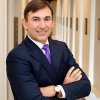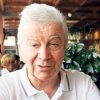His research involves the chemistry and synthesis of surfaces that contact biological environments. His laboratory has pioneered several technologies, including strategies to integrate living cells with microelectronic devices, methods to enable high throughput assays for drug discovery, and approaches to making synthetic fusion proteins for applications as therapeutics. Most notably, he developed the SAMDI-MS biochip technology that allows for high-throughput quantification of surface-based biochemical assays using MALDI mass spectrometry. Through SAMDI-MS, Mrksich has become a leader in using label-free technology for drug discovery, founding the company SAMDI Tech in 2011 that primarily serves global pharmaceutical companies. His work has been described in over 200 publications (h-index 88), 500 invited talks, and 15 patents.
Mrksich was born on August 15, 1968 and raised in Chicago. He graduated from University of Illinois at Urbana-Champaign in 1989 with a B.S. in chemistry before completing his PhD in organic chemistry in 1994 from Caltech under chemist Peter B. Dervan. After graduate school, he was an American Chemical Society postdoctoral fellow at Harvard University under chemist George M. Whitesides before joining the faculty at the University of Chicago in 1996. He worked here for 15 years before joining the faculty at Northwestern University in 2011.
Early career
Early on as an independent investigator, Mrksich developed and executed the concept of dynamic substrates for cell culture. Here, self-assembled monolayers (SAMs) present cell adhesive ligands with perfect control over density and orientation against a non-adhesive, inert background, such as ethylene glycol. These monolayers can be further modified with electroactive groups that selectively release immobilized ligand when stimulated with an electric potential. Several strategies using this approach were studied in the context of cell signaling, migration, and co-culture. Subsequent cell-based work focused on developing methods to pattern cells on the aforementioned SAMs. The work has mostly utilized microcontact printing to confine adherent cells into defined positions, shapes, and sizes. Ultimately, his group's work has revealed examples of how cellular mechanics and cytoskeletal structure influence phenotype. A primary example of this involved investigating how cell shape exerts control over the differentiation of mesenchymal stem cells. Further work utilized these patterned monolayers to investigate the relationship between various cytoskeletal elements and to observe complex phenotypic differences in patient-derived neuroprogenitor cells. Recent work in the group investigating cell patterning has utilized photoactive adhesive peptides, allowing for local, spatiotemporal control of cell adhesion to study gap junction formation.
SAMDI-MS
While performing much of the early dynamic substrate and cell patterning work, Mrksich also pioneered an assay platform that utilizes SAMs of alkanethiolates on gold. The monolayers contain capture ligands (e.g. biotin or maleimide) that can selectively immobilize a peptide of interest. Subsequently, the monolayer can treated with a specific enzyme or a complex mixture, such as cell lysate, that can modify the peptide through various biological processes (e.g. phosphorylation). For quality control, the monolayers present these peptides against a background of tri(ethylene glycol) groups to prevent the nonspecific adsorption of protein to the surface that could obfuscate the reaction signal and, therefore, enable quantitative and reproducible assays. Most significantly, the monolayers can be characterized with MALDI mass spectrometry in a technique known as SAMDI-MS, which provides the masses of the substituted alkanethiolates and, therefore, the mass change of the immobilized peptide that results from enzyme activity. The method is compatible with standard array formats and liquid handling robotics, allowing a throughput in the tens of thousands of reactions per day. Importantly, the matrix-assisted laser desorption time-of-flight mass spectrometry (MALDI-TOF) analysis provides a fast and quantitative mass shift readout without the need for labels.
Megamolecules
Most recently, Mrksich's group has focused on developing a technique for assembling large molecular structures with perfectly defined structures and orientations, known as Megamolecules. This is primarily done through use of fusion proteins and irreversible inhibitor linkers that assemble stable intermediates. Structure-function relationships, including synthesis of cyclic and antibody-mimic structures have been investigated for potential therapeutic application.
Awards and honors
1990 — National Institutes of Health National Research Service Award
1993 — Ralph M. Parsons Foundation Graduate Fellow
1994 — American Cancer Society Postdoctoral Fellow
1996 — Searle Scholar Award
1996 — Camille and Henry Dreyfus New Faculty Award
1996 — DARPA Defense Sciences Research Council (2004-, Vice-Chair)
1997 — Editorial Board of Langmuir
2000 — A.P. Sloan Research Fellow
2000 — Camille Dreyfus Teacher-Scholar
2000 — WTEC Panel for International Evaluation of Tissue Engineering Programs
2001 — Extramural Chair for NIH/BECON Symposium on Biosensors
2002 — TR100 Young Innovator Award
2002 — International Panel for Review of Materials Research in United Kingdom
2003 — Board of Governors for Argonne National Laboratory
2003 — American Chemical Society Arthur C. Cope Young Scholar Award
2004 — Advisory Board of the Searle Scholars Program (2007-present, Chair)
2004 — Editorial Board of Chemical Society Reviews
2004 — Editorial Board of Chemistry & Biology
2005 — Fellow, American Association for the Advancement of Science
2008 — Editorial Board of Small
2011 — Founder and Chairman, SAMDI Tech, Inc.
2013 — Fellow, American Institute for Medical and Biological Engineering (AIMBE)
2014 — Advisory Professor, Institute of Chemical Biology and Nanomedicine, Hunan University
2015 — Visiting Professor, Institute for Nanomedicine at NTU, Singapore
2016 — iBIO iCON Innovator Award
Milan lives in Hinsdale, IL with his two children. He enjoys golfing and playing the electric guitar.
Source: Wikipedia





